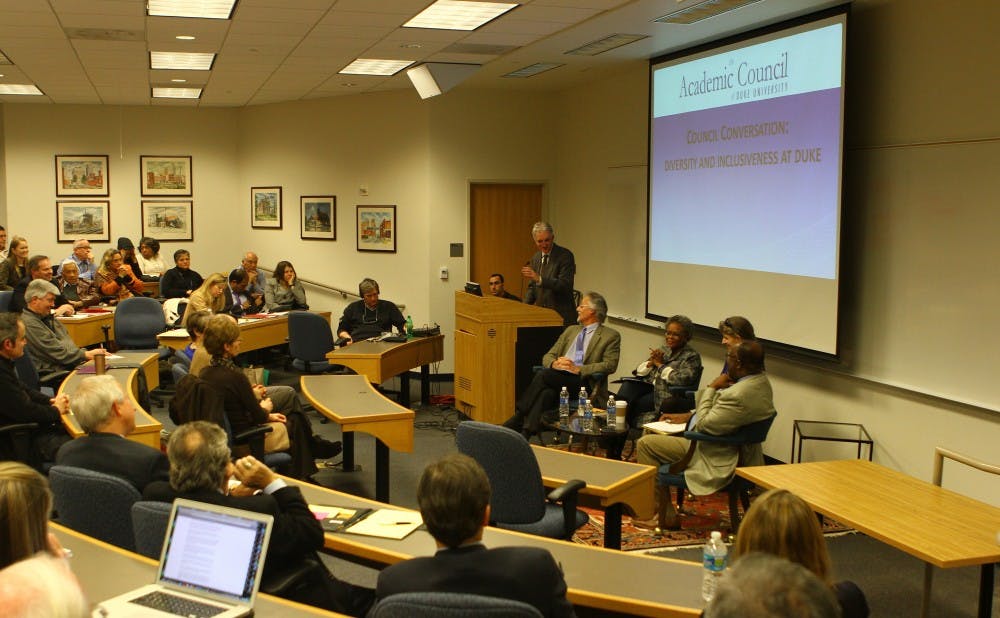A proposal to create an Academic Council Diversity Task Force was passed Thursday, following a council conversation on faculty diversity last month.
The new task force is charged with articulating a vision of a diverse and inclusive university for the next decade and beyond, studying the recent demographics of faculty and hiring processes and recommending actions that will move the University toward that vision. The council projected the size of the task force would be 12 members, including the council chair.
“This is the right time for faculty to step up since the last 10-year diversity initiative has ended and we have a new provost coming,” said Council Chair Joshua Socolar, professor of physics. “The goal is to make it a faculty-owned process, which will have a better penetration down to the level of faculty doing searches when recruiting people.”
Socolar noted that many efforts have been made over the last 10 years to create a more diverse and inclusive faculty, and it is time to amplify those efforts by adding a distinct faculty voice to the discussion.
“Things are changing on campus," Socolar said. "What we understood to be the goal of the first Faculty Diversity Initiative might have been to increase the number of black faculty, and we recognize now that there needs to be a broader understanding of the goal."The Council will start soliciting nominations from all faculty members in the hopes of creating a group with a wide range of perspectives.
“There is a logic of paradox here," Socolar said. "We want to enlist a diverse group, and we rely on that group to tell us what diverse means and how to achieve it."
The task force will submit an interim report to the council in Fall '14 and a final report Fall '15.
In other business:
Paula McClain, dean of the Graduate School and vice provost for graduate education, presented on the impact of the increasing number of master’s programs and master’s students.
From 2008 to 2012, there was a 21 percent increase total in the number of students in master's and professional degree programs, McClain said, adding that, in Pratt alone, the number has increased by 86 percent. The rapid growth of both the number of master’s programs and the number of students in those programs have raised concerns among faculty, including effects on undergraduate education and impact on the intellectual environment of the University.
In response to such concerns, McClain said the Graduate School will strive to achieve balance among the three populations of students on campus—undergraduate, master's and doctoral students.
McClain noted that the Graduate School has undertaken a broad survey of master's education at Duke. Efforts include a faculty survey, contacting peer institutions for data on their master’s programs, contacting Counseling and Psychological Services, restructuring the English for International Students program and collaborating with Housing, Dining and Residence Life and the library system.
“The push for master’s degrees has been out there," McClain said. "In some ways we are a little affected by that, but we are much more careful about it than some other public institutions. The Graduate School has begun to think about these issues when we are evaluating proposals of new degree programs.”
Mary Bullock, executive vice chancellor of Duke Kunshan University, presented updates and plans for DKU to the Council.
Bullock noted that DKU has completed all the approvals and will open this fall with three master’s programs in global health, medical physics and management studies. Curricula are in place, and the search for faculty is nearing completion.
Bullock said that faculty have been given the primary role in shaping the academic programs at DKU. During the first two years, 50 Duke faculty will be teaching at DKU, and five of the nine faculty appointment committee members are affiliated with Duke.
“The hope is that 10 years out, or earlier than that, there will be a regular flow of faculty between DKU and Duke,” Bullock said. "The number of joint research centers and opportunities for Duke faculty to develop joint research projects will also be enhanced.”
She emphasized the importance of faculty governance at DKU.
“China does not have a strong system of faculty governance,” Bullock said. "DKU will be modeled on the best American university practices, and we can set a model for Chinese universities.”
Get The Chronicle straight to your inbox
Signup for our weekly newsletter. Cancel at any time.

